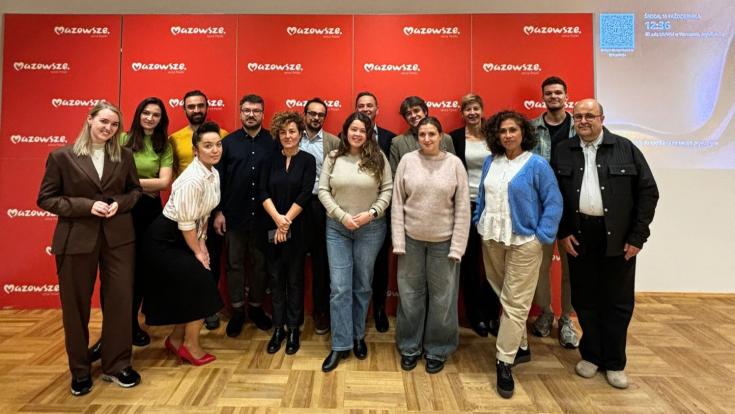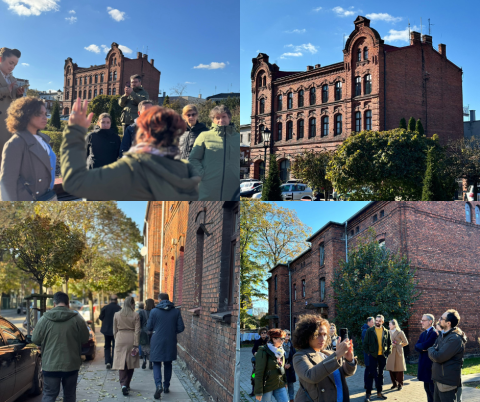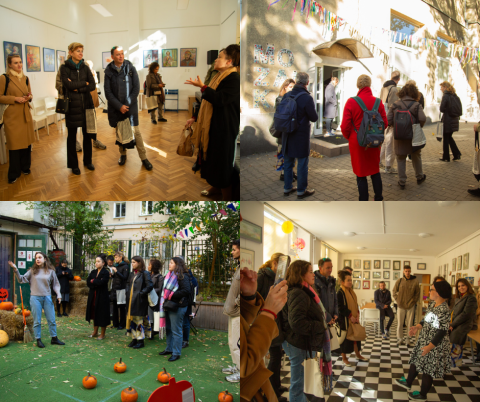Temporary Uses and Urban Agencies: highlights from Warsaw

The third IMPETUS thematic seminar took place in Warsaw on November 16 and 17, bringing together partners and stakeholders to explore the important role of urban agencies in managing and facilitating temporary uses within city spaces. Hosted by the Mazowieckie Voivodeship, the gathering looked closely at the intermediary work these agencies do, whether public, private, or public-private in structure. They support, initiate, or coordinate temporary use projects, bridging gaps between stakeholders, providing essential resources, and guiding legal and safety compliance. Through their work, they help transform vacant urban spaces, offering assistance and coordination to all involved. The seminar highlighted good practices concerning the theme.
Greta Droździel-Papuga from Warsaw City Hall’s Social Communication Centre shared the vision and operation behind the Spółdzielnia/Cooperative initiative, an online platform that addresses the underutilisation of resources in cultural and social organisations offering a solution that is as simple as it is effective: organisations can freely rent out materials and equipment, promoting a circular economy and supporting the organisation of sustainable events. This model fosters community collaboration, creating new networks of support and enabling cultural activities to thrive with minimal environmental impact. Vassili Duverly presented the Urban Planning Agency of the European Lille Metropole (ADULM), which coordinates the temporary use of vacant spaces by encouraging stakeholder collaboration and harmonising policies. ADULM utilises a public map to track underused spaces, offering insights to authorities, developers, and property owners. It partners with local organisations to support strategic urban planning and maximise the potential of vacant spaces. Through this work, ADULM not only promotes efficient space use but also helps shape the future development of the region.

The seminar also welcomed two guest speakers. Paul Vogt, architect and founding member of ADAPTER, outlined the organisation's approach to addressing housing needs by temporarily exploiting unused residential and commercial spaces, focusing on participation and collaboration. ADAPTER activates these spaces through workshops and temporary initiatives, valorising underutilised properties. Vogt explained the legal framework and collaborations with authorities to formalise the legal paths related to temporary use, thus simplifying the implementation of future projects. Professor Alexandru Ionut Petrisor from the “Ion Mincu University of Architecture and Urbanism” reviewed Romania's legal framework for temporary land use, which varies based on whether the land is vacant or developed and whether ownership is public or private. Following the 1989 fall of communism, land ownership shifted from unified state ownership to a mix of national, local, and private hands, leading to unique legal situations for temporary use. Petrisor highlighted Romania’s dual regulatory approach and the role of private platforms like Calup in supporting temporary urban projects.
During the two days, participants engaged in two study visits that provided practical insights into community-led revitalisation and the creative reuse of urban spaces: the former factory sites in Żyrardów and the Wolski Cultural Centre in Warsaw.

For over 150 years, Żyrardów was a centre of textile excellence in Europe, with an urban development characterised by red brick buildings constructed in the 19th and 20th centuries for workers and managers. At the end of the 19th century, in addition to being the largest producer of flax in Europe and Russia, Żyrardów was a modern and unique global city. However, the industrial monoculture led to the economic collapse of the city, prompting urban regeneration efforts. Since joining the Forum for Revitalisation Association in 2000 and adopting a Local Revitalisation Programme (LRP) in 2004, Żyrardów has focused on preserving and promoting its industrial heritage to drive socio-economic development, marking a historic turning point after years of crisis.

The Wolskie Cultural Center envisions a reclaimed and socialised space within both the institution and the district, serving as a hub for culture-driven activities grounded in relationships and partnership. It strives to create an ideal cultural space shaped by community members who feel a strong sense of belonging and ownership. By connecting creators and audiences from a wide spectrum of cultural expressions, the centre aims to foster integration and strengthen local identity, building a community that embraces contemporary ideas while remaining rooted in Wola’s heritage. The Wolskie Cultural Center's mission is to build a creative, inclusive community. It brings together cultural creators and audiences to collaboratively design and support the centre’s cultural programme, enhancing its role as a dynamic and participatory cultural institution.
